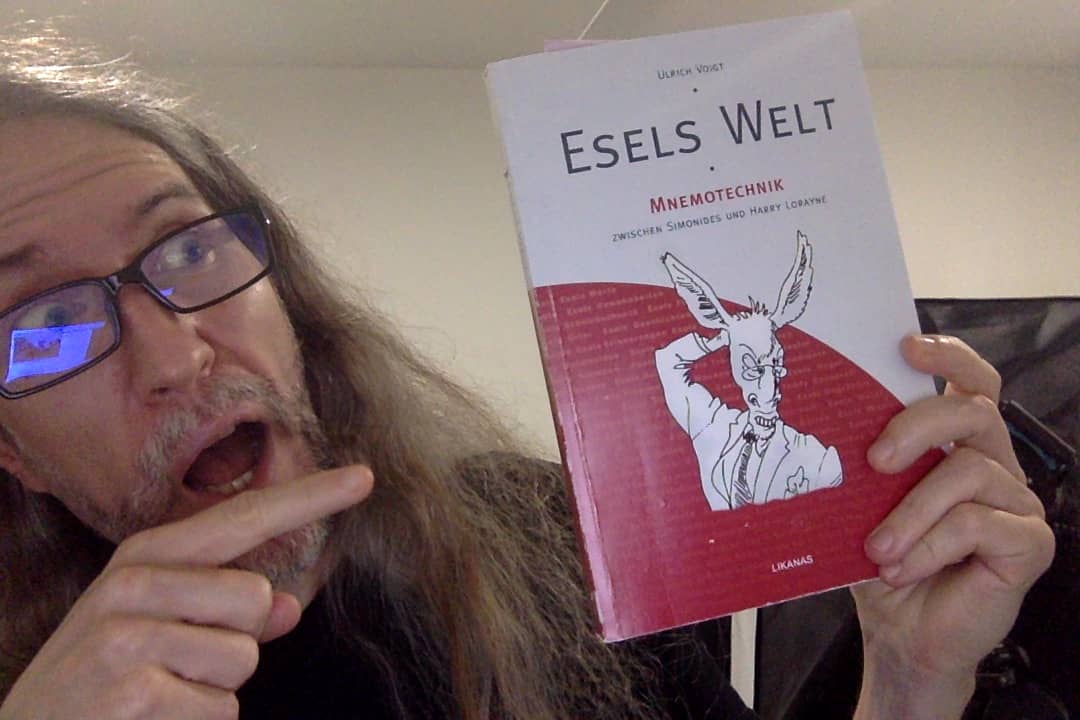Podcast: Download
Subscribe: Apple Podcasts | RSS
 Would you like to pick the mind of the greatest living Major System masters?
Would you like to pick the mind of the greatest living Major System masters?
If so, click play above and dive into the incredible mnemonic talent of Florian Dellé.
In this exclusive interview with Florian on the Magnetic Memory Method Podcast, you’ll discover:
♣ The key factors that make memory competition more exciting to participate in and watch as a spectator …
♥ The number one need every student of memory techniques must fulfill to experience their true capabilities …
♠ The connection between using your memory and motivation. Master this and you’ll create a state of excitement that helps you overcome all kinds of learning obstacles and barriers!
♦ Why you shouldn’t waste any more time on boring and frustrating learning techniques …
♣ Why everything we do with memory techniques always builds on the work of others …
♥ How to use forms and shapes to help you memorize keywords and the names of cells, golf statistics or anything you want to memorize …
♠ How to use chain stories, image clusters and other ideas locked up in Esel’s Welt …
♦ How to create a second or even third Major Method/Major System list to create multiple memory advantages and more variety in your mnemonic tool box …
♣ The “annoying” truth about reusing your mnemonic images and Memory Palaces …
♥ Why these techniques are never just about having a “code system”
♠ Florian’s PAO system with 1000 people and 1000 objects and how specifically he works with them in sets of 100 in order to generate a workable memory system. Understand the thinking behind his strategy and you’ll be well-equipped to evolving your own approach for achieving any learning goal.
♦ Florian’s amazing Pyramid Memory System …
♣ How to open your image sets for any purpose without getting bogged down by dogmatic rules.
♥ The limits of the Major System and why Florian decided to expand and create his own.
♠ Why some people FEAR the Major System and how to overcome this hurdle so that you can feel the fun while experiencing its many benefits …
https://youtu.be/R0nJj0-E-g4
♦ Why Florian likes movement and even abstract images, as opposed to stationary objects like street lamps in his memory practice …
♣ Why boredom should be avoided at all costs when learning to use memory techniques …
♥ Why Florian created ThinkKniht and developed an alternative to the Major System …
♠ How to find your “feeling” for the Major System associations so that you’re happy with it and using it to maximum effect from the beginning …
♦ The difference between a “native society” and a “civilized society” and the role of apps for the future of your memory …
♣ The difference between learning, training and coaching software yet to come. Understanding how all these softwares can be relevant for your learning will blow your mind with all the possibilities …
♥ Why trial and error might eventually be eliminated from the learning process. The only question is … will that be a good thing or bad?
♠ Why you should never be intimidated by the lingo and “systems” of memory techniques and how to quickly get yourself into the practice of using your memory … even if you initially doubt the efficiency of the initial training period …
♦ … and much, much more!
(Note for puzzle-fans: Can you see the special mnemonic I’ve hidden in the special-characters?)
I’m grateful for this discussion with Florian and look forward to hearing your response. Be sure to follow Florian on Twitter and support his mission in bringing mnemonics and the real magic of memory to everyone around the world.
Resources Mentioned In The Podcast &
Other Great Links To Explore
Esels Welt by Ulrich Voigt
Alex Mullen Interviews Florian Dellé
Florian’s World Memory Championship stats – impressive!
Related Posts
- Stoic Secrets For Using Memory Techniques With Language Learning
Christopher Huff shares his Stoic secrets for using memory techniques when learning a language. You'll…
- 2019 Canadian Memory Champion Reveals His Memory Secrets
James Gerwing completed the Magnetic Memory Method Masterclass a while ago. In 2019, he became…
- 2019 Canadian Memory Champion Reveals His Memory Secrets
James Gerwing completed the Magnetic Memory Method Masterclass a while ago. In 2019, he became…





15 Responses
Ufff… I read too many Science Fiction books I suppose. An AI teaching me seems strange to me. But we don’t know what’s gonna happen.
The press helps Luther spread his ideas, the railway spread the people in North America to the whole country much easier and of course the invention of the iPhone reveals a complete new view to the telecommunication market. We can’t predict our future and that’s good otherwise we wouldn’t be involved.
Some codes of the Major system is a bit difficult, because you can’t find a useful image. I agree with him at this point. You both left much questions open.
Bye
Björn
Interesting point about how our inability to tell the future keeps us involved in shaping it, Björn.
What are some of the number combinations with the Major that you struggle with the most? 🙂
Hey Anthony,
I’ll will send you an email with my codes and tell you more about it then.
Hi Anthony!
I was listening to the podcast and everything was fine until Florian started to speak about the “wardrobe” or categorization of the major system. I googled it to learn more about the topic and naturally, I faced with Florian’s website. I read his articles about the Major system and understood with no problem.
The problem, again, was when he started to talk about “categorization” of the major method. I didn’t understood that, and even worse, he started to talk about his powerful POA system and I got totally lost. So after spending time trying to figure it out, I decided to ask for help.
So, having said this, here are my questions:
Bearing in mind that for the Major system (e.g., in a system for 100 numbers, 0 to 99) you must create 100 words/images for each number, and if I want to apply the categorization system, how must I create the categories (e.g., 10 categories and each one with 10 numbers)?
Taking as examples three categories that Florian mentioned in his post:
Cartoons
Disney
TV Series
If I want to categorize the numbers 0 to 10 with TV series characters, must I search names of characters that fit in with the numbers of the category (e.g., for 0 that in the classic major system correspond to the letter z, I could use zord, a character of Power Rangers) or what is the criteria to categorize a number (with his respective word) according to a specific topic like cartoons or disney characters?
That’s my principal question, HOW TO categorize? I understand the benefits of it, but I didn’t get how to do it.
I would be very grateful if you could help me, sorry if my grammar isn’t the best.
Regards!
Hi Daniel, there is no right or wrong here. You can use any sizes for the categories. Something that worked best for me are categories of ten each or one hundred each. But you could break it down in any other size as well. It should probably work well with our decimal system but even that is no requirement.
What images you should pick also depends heavily on your approach. If you want to use the Major System to order each category you can do it as you suggested and look for fitting images like Zord for 0.
I didn’t want that limitation so I used no code whatsoever but a more logical approach. My 000-009 are the Simpsons. They start with the main character, which I decided should be Hommer (000), followed by his sidekick Bart (001), then the close family and later the less relevant characters.
This alone is already helpful but not perfect. So I paired it by bringing in other memory techniques, which I explain in detail in my article http://memory-sports.com/blog/memory-techniques/the-pyramid-memory-system/.
PAO stands for Person-Action-Object. You can find many articles about that on the web. It is a variation/upgrade for a standard Major System list and also works with other methods like the Dominic System.
Thanks, Florian. These are good additional pointers and the Pyramid material you’ve linked to is fantastic.
Daniel:
Let us know how you go with this technique. I think a general guiding principle is that so many representation systems already have guiding characteristics to them. So groups of ten, groups of 25, groups of 50, etc. are all divisions that we already know. We can lean on these to help guide our connections. 🙂
What is the name of the app that Florian mentions? It sounded something like “Memory Leads.”
Thanks for the fascinating podcast!
Hi Anthony, I am just now able to listen to this podcast. It is a great podcast and a new way of thinking or me. Florian is a great speaker and I enjoy his website. Very creative. I will be following up with Mindshift when I can. As always Great podcast Anthony.
Thanks, Bill. Glad you could give it a listen. Stay tuned for some more great interviews next in line! 🙂
Anthony,
What a great podcast. As usual, you ask very interesting questions–the ones I would ask if I were there myself. I have visited Florian’s website to learn more about his Visual Method. In addition to information you have on your site and in your podcasts, this is a great resource. Thanks again for all you do.
I’m glad I’m able to ask the right questions, Carolyn. Thanks too for checking out Florian’s work. It is very good and helpful to many – I hope more people will find it and your comment here will help make that happen. Thanks as always for your participation and talk soon!
Anthony, did you end up recording the second interview?
We haven’t yet. I know he’s been super-busy lately, but I’ll reach out to him again soon. Thanks for asking!
Thanks for the fascinating podcast!
Our pleasure!